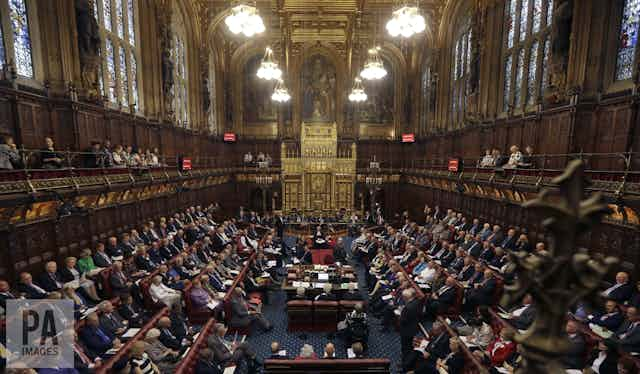On looking up the word “irony” in a dictionary, one would be unsurprised to see a picture of a member of Britain’s unelected upper house indignantly asserting that “you either believe in democracy or you don’t”. Yet that is what the debate over Brexit in the House of Lords produced. In the midst of proceedings, former chancellor Norman Lamont, now a Conservative peer, stood to warn that if peers obstructed the government’s Article 50 bill, they would be disrespecting the June vote to leave the European Union.
But the stumbling history of attempts to reform the House of Lords suggests that Britain’s national answer to Lamont’s rhetorical challenge is at best ambivalent. The call to “end it or mend it” was first heard more than a century ago, yet the upper house continues to operate as an unelected chamber.
At the start of the 20th century, the Lords had the same power of veto over laws as the House of Commons and supplied many senior ministers – including the prime minister. As full suffrage was introduced, the upper house became a revising chamber. It amends laws but doesn’t have ultimate control over them. Its role is supposed to be that of a voice for independent, informed advice to the more turbulent, adversarial, but also democratically legitimate House of Commons.
The eurosceptic press and government ministers have lately become exercised by the possibility that the House of Lords, none of whose members is elected or accountable, might block the Brexit bill. Some opponents of Brexit, on the other hand, have invested hopes in their lordships as a way of passing amendments to the legislation. They want to see them, for example, insisting that the government commit to the rights of non-British EU citizens resident in the UK before triggering Article 50.
The prime minister, Theresa May, even took time out to cast a wary eye over the debate in the Lords so as to make manifest her eagerness that the bill should pass without delay or alteration.
Tinkering for decades
The hostility might indicate a renewed appetite for reforming what is, after all, almost the only appointed and hereditary legislative chamber in the world. But any such expectation is likely to be disappointed.
Reform of the Lords has usually been most popular on the political left. When the Lords rejected David Lloyd George’s “People’s Budget” in 1909, he accused them of being “500 men chosen at random from amongst the unemployed”. The confrontation ended with the upper house losing its power of veto over government legislation in 1911.
Then, Clement Attlee’s Labour government reduced the Lords’ delaying power to a year in 1949, and, 50 years later, Tony Blair cleared out all but 92 of the hereditary peers. The latter transformed the Lords into overwhelmingly an appointed house. Its members were ostensibly characterised by bringing expertise and experience in public life to the legislative process.

But there has been as much failure as success in the reform process. Blair’s reforms were supposed to be the prelude to bringing in a predominantly elected chamber. But despite being given seven alternative compositions for the new chamber in 2003, the House of Commons rejected them all. When the Commons agreed to a fully elected upper house in 2007, the Lords rejected the idea overwhelmingly.
All three main parties approached the 2010 election promising a mainly elected Lords and this commitment was written into the coalition agreement between the Conservatives and the Liberal Democrats. But the proposal came up against hostility from Conservative backbenchers and Labour MPs. The former were unhappy with the principle of election, the latter with the timing. The plan was abandoned.
The Conservatives have joined the chorus of disapproval for the Lords since 2015. First they were irked by its interference with the abolition of tax credits in 2015, and now over Europe. Some even ask whether a second chamber is needed at all.
But successful reform requires an unusual combination of circumstances. The issue has to be vital to the government (Asquith’s Liberals fought two general elections over it and talked George V into threatening to flood the Lords with reformers) and the government must have a clear majority (like Blair’s landslide) to override any doubters in its own ranks. And, ultimately, the Lords itself has to be willing to acquiesce. This is not a description of the circumstances of Theresa May’s Brexit administration.

